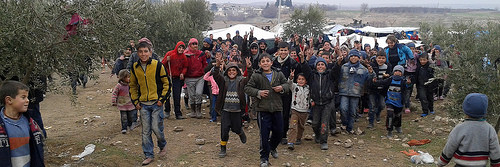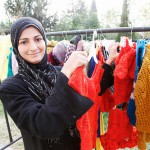 Islamophobia has no place in the life of a Christian who has been given the confidence of salvation in Christ and the joy of a new mission in this world.
Islamophobia has no place in the life of a Christian who has been given the confidence of salvation in Christ and the joy of a new mission in this world.
Sadly, American Christianity has been very busy forgetting about its sense of mission in recent times, forgetting that it has been blessed to be a blessing–and not for its own sake. It has focused dramatically on its own inner blessedness and its own insular privilege and very little on what it means to be a person on mission.
Mission has looked very much like those things that your average American Christian wants anyway: nice buildings, coffee shops in the church lobby, performance-style church services, fancy youth programs. And while there is nothing inherently bad about these conveniences, equating them with the mission of Christ itself has left us focused on self instead of on neighbor.
And so when a neighbor appears who is in need, is it any wonder that our first response is, “Not in my nice, clean, convenient world!”? Is it any wonder that our first thought as Christians–and our enduring primary focus–is safety and comfort, even to an absurd level?
The mission of Jesus Christ is this:
“All authority in heaven and on earth has been given to me. Therefore go and make disciples of all nations, baptizing them in the name of the Father and of the Son and of the Holy Spirit,and teaching them to obey everything I have commanded you. And surely I am with you always, to the very end of the age.”–Matthew 28:18-20 (NIV)
But these days, a Christian need not even cross an ocean to share the Gospel with other people. In fact, God has been so gracious as to bring people who are not Christians to America, and to provide opportunity for more to come. According to Pew’s 2013 study, “The World’s Muslims,” only 11% of Muslims in Iraq (the closest country to Syria surveyed) said they knew “a great deal/some” about Christianity. And 97% of Muslims in Iraq said that “all/most of their close friends” were fellow Muslims. That means that, unlike most people in America (who can visit their local church on the corner or Christian bookstore, or talk to a Christian friend), these folks are practically unreached with the Gospel. How Christians treat them now could literally form their complete opinion of Christians from here on out.
Will their experience soften their heart? Or will it harden it?
Sharing the Gospel involves not only the forgiveness of sins and the hope of eternal life, but has ramifications for the world today. As Christian leader Jo Saxton told me recently, it is “inviting people into the renewal of all things.” The renewal of all things encompasses all of creation. If the Gospel is looked at this way, sharing its message will include a holistic approach, focusing on the total person and their needs. It should never be done in a way that abuses the power the Christian has over those who are poor or suffering or vulnerable. It should offer support, care, and provision for physical needs without any strings attached. But it should also be done gladly, with the communication that we are serving because Christ has served us, because Christ has saved us. We love you, with no strings attached. We invite you to join us, but if you do not, we will still befriend you and care for you. (Hear me on this caveat, friends. Love is not conditional.)
If mission matters to us at all as American Christians, it could open our eyes to see the coming of Syrian refugees as one of the great people movements of God, an opportunity to know those from another place and to reach to them in mission in a momentous way. We don’t even have to cross the ocean anymore. They are coming to us.
And furthermore, God’s great mission so often blesses His people. As a missionary kid, I learned the lesson that usually when I visited other cultures, I came away from the experience more blessed than those whom I served. Knowing these precious ones was a rich experience. The poor and suffering have so much to give to us if we will but receive. Being with them is a gift.
Certainly, it is understandable that we see the terrorist attacks on Paris and around the world, the videotaping of beheadings, the raw violence of ISIS … and we are afraid. We are human. It’s human to be afraid. But Jesus calls us away from that fear. He says to us, “Fear not!” He says to us, “I am with you always, to the end of the age.”
But even if you should suffer for what is right, you are blessed. “Do not fear their threats; do not be frightened.”But in your hearts revere Christ as Lord. Always be prepared to give an answer to everyone who asks you to give the reason for the hope that you have. But do this with gentleness and respect, keeping a clear conscience, so that those who speak maliciously against your good behavior in Christ may be ashamed of their slander.
–1 Peter 3:14-16 (NIV)
We are so privileged to live in these times, in which our world is so very connected that we can help those who are suffering so very easily, compared to times past. We are so blessed to have been given the Gospel, which frees us from our obsession with navel-gazing and frees us to look up into the eyes of our neighbor. We are cared for, loved, and sustained through Christ. We are free to love and reach out to the one who needs us. We are freed from fear. We are given a mission to reach out and serve in Jesus’s name. We are given a mission to see in our neighbor the very face of Christ.
Let’s take the opportunity!
——————-
Community discussion guidelines:
Because this is a Christian blog, the things I’m talking about will obviously be topics that people feel strongly about in one direction or another. Please keep in mind that this is a place for substantive, respectful, constructive conversation. All perspectives are welcome to discuss here as long as all can treat each other with kindness and respect. Please ignore trolls, refuse to engage in personal attacks, try not to derail the conversation into divisive rabbit trails, and observe the comment policy listed on the right side of the page. Comments that violate these guidelines may be deleted. Vulgar remarks may result in immediate blacklisting. For those who clearly violate these policies repeatedly, my policy is to issue a warning which, if not regarded, may lead to blacklisting. This is not about censorship, but about creating a healthy, respectful environment for discussion.
P.S. Please also note that I am not a scientist, but a person with expertise in theology and the arts. While I am very interested in the relationship between science and faith, I do not believe I personally will be able to adequately address the many questions that inevitably come up related to science and religion. I encourage you to seek out the writings of theistic or Christian scientists to help with those discussions.
———————-
photo credit: Jarabalus 2014-01-25 via photopin (license)















